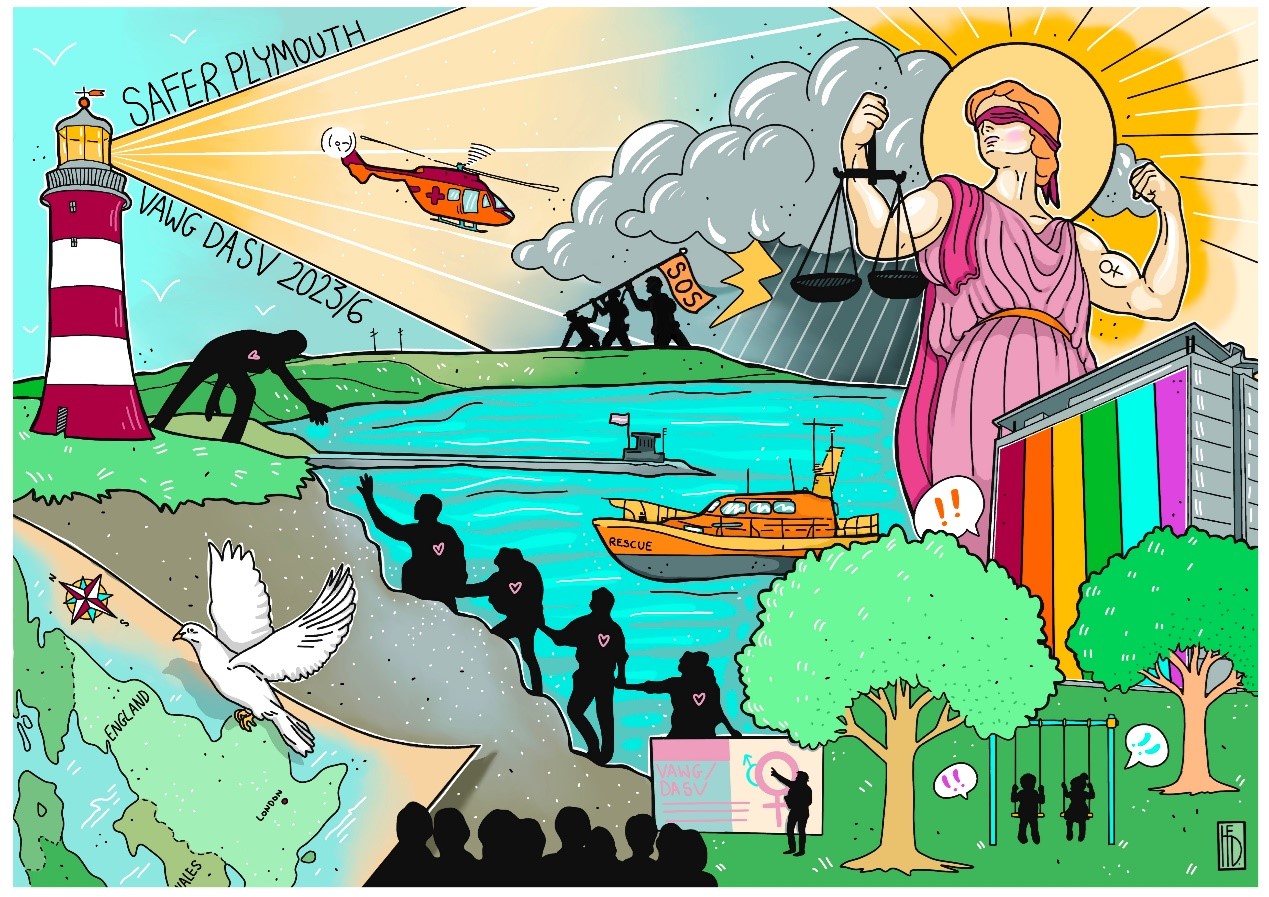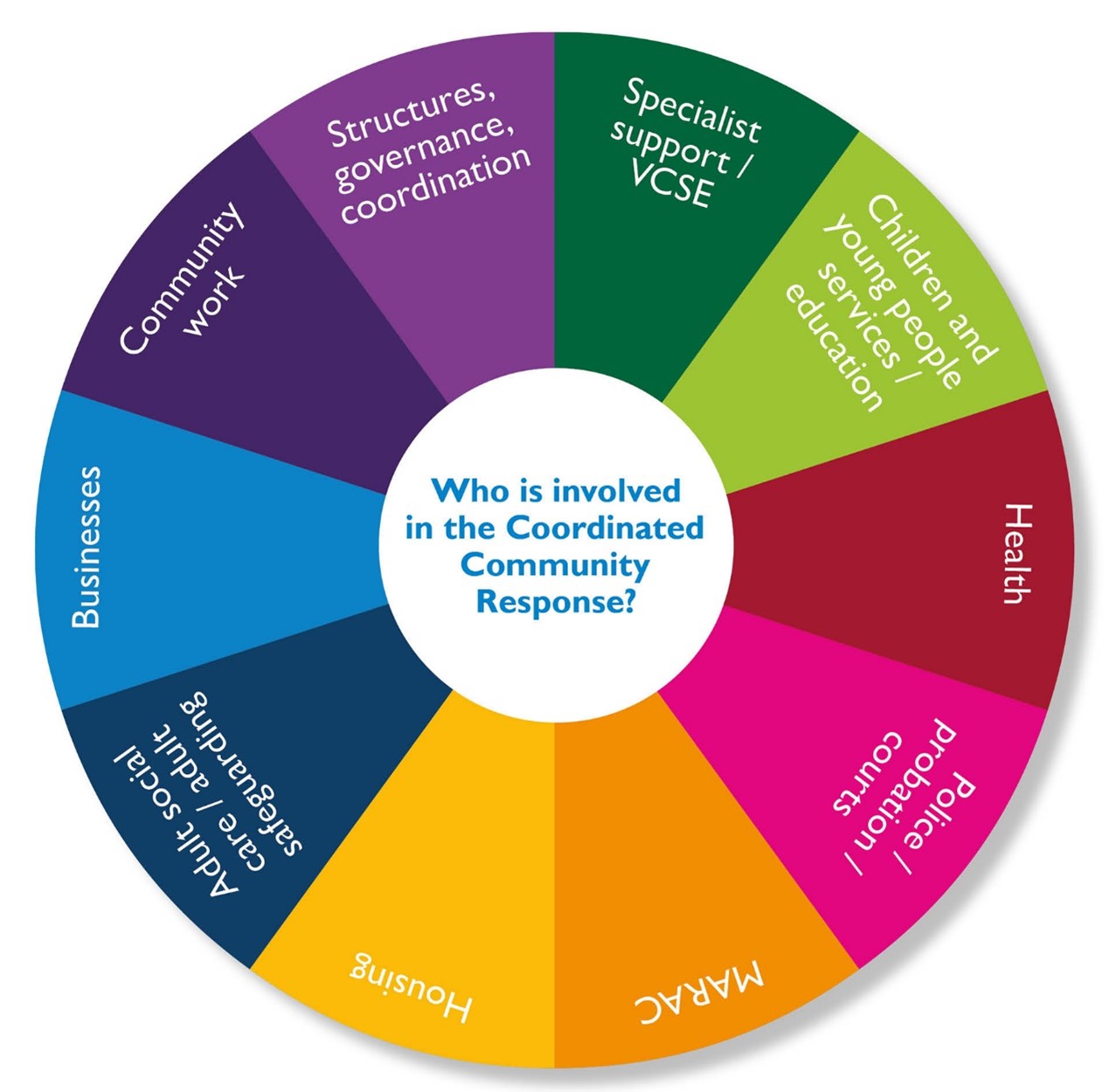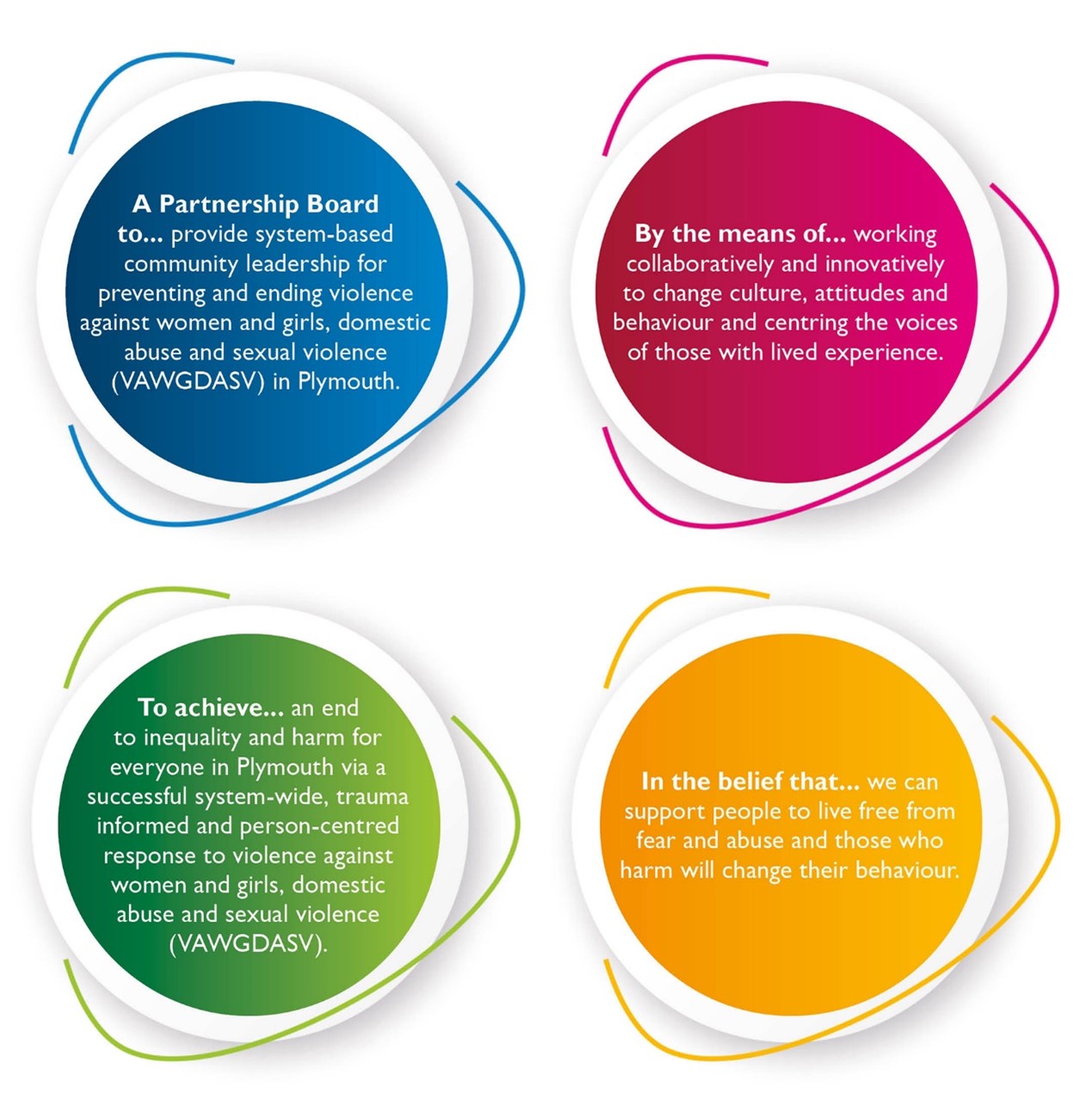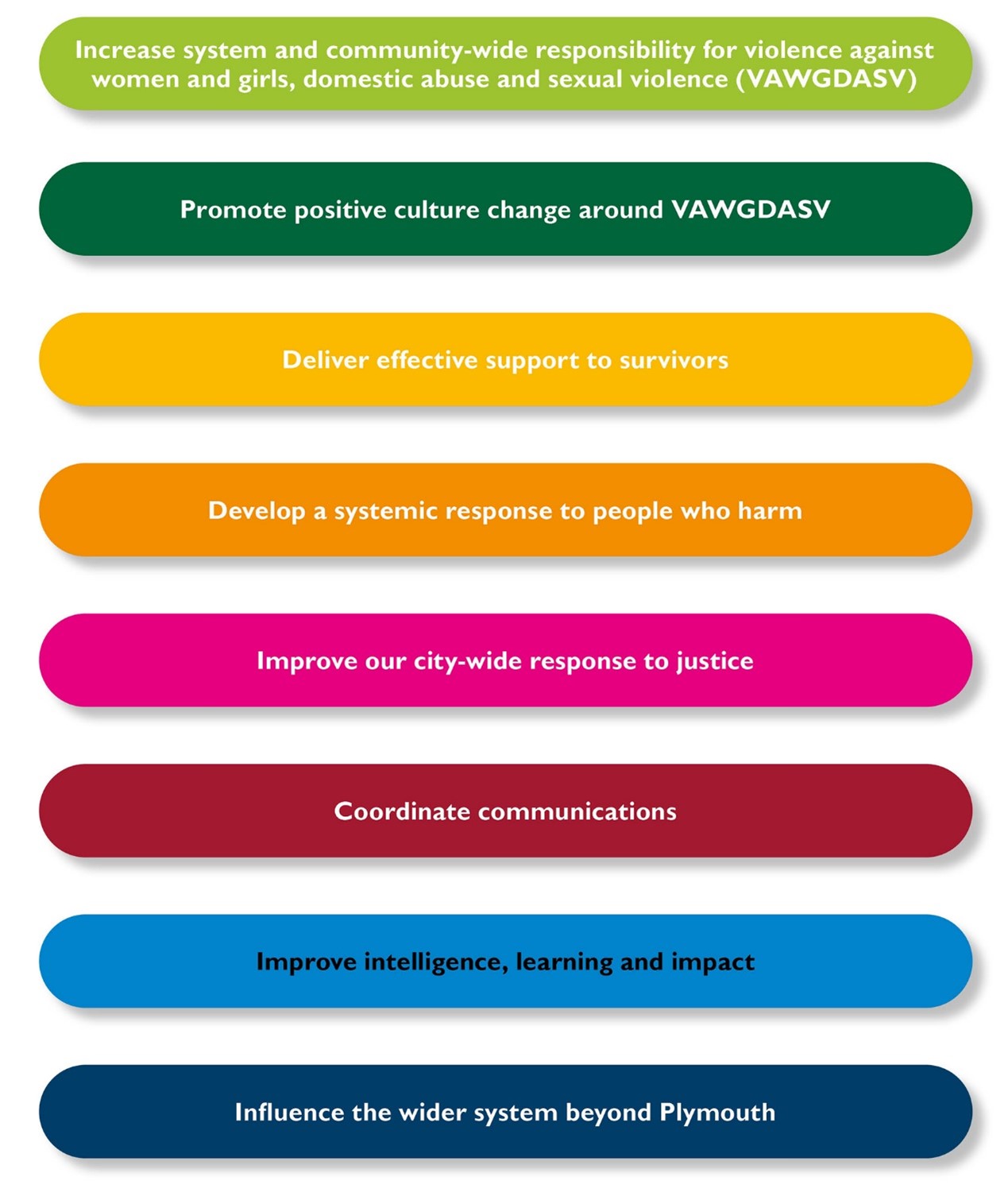
In Plymouth we recognise that tackling violence against women and girls (VAWG), domestic abuse and sexual violence (DASV) is everyone's business. Our Coordinated Community Response brings services, businesses and the wider community together to keep survivors safe, hold people who harm to account and prevent violence against women and girls, domestic abuse and sexual violence.
Each year in Plymouth there are around 5000 reported domestic abuse crimes to police, around 3000 stalking and harassment crimes and around 1000 sexual offences. It is important to note that these figures do not reflect the full picture of violence and abuse in Plymouth as these types of crimes tend to be underreported for a number of reasons.
Victims of interpersonal violence in Plymouth are disproportionately women and people who cause harm are disproportionately men (69.3% of domestic abuse victims are women and 74.4% of suspects are men).
Domestic abuse is one of our leading drivers of homelessness in the city and a significant factor in children and families being involved with Children’s Social Care.

Definitions
We use the phrase Violence Against Women and Girls, Domestic Abuse and Sexual Violence (VAWG DASV) to refer to all forms of gender-based violence, domestic abuse and sexual violence. We recognise that anyone can experience and be affected by violence and abuse and at the same time, evidence shows us that women and girls are disproportionately affected by violence and abuse and men disproportionately are responsible for causing harm.
The term, Violence Against Women and Girls (VAWG) refers to acts of violence or abuse that we know disproportionality affect women and girls. Crimes and behaviour covered by this term include rape and other sexual offences, domestic abuse, stalking and harassment, so called 'honour-based' abuse, (including female genital mutilation, forced or early marriage), drink spiking, misogyny, sexism and pornography.
Violence Against Women and Girls (VAWG) is both a cause and a consequence of gender inequality.
This definition is based on the Home Office Violence Against Women and Girls definition. However it also includes drink spiking, sexism, misogyny and pornography which were added by the Plymouth Male Violence Against Women and Girls Commission.
Gender-based violence (GBV) is often used interchangeably with Violence Against Women and Girls (VAWG) and refers to harmful acts directed at an individual or a group of individuals based on their gender. It is rooted in gender inequality, the abuse of power and harmful norms.
This is taken from the United Nations definition of Gender Based Violence.
We know that men, boys and gender diverse people are also victims/survivors of violence, abuse and affected by harmful gender norms. Our plans and partnership work seek to prevent and address all forms of gender-based abuse, domestic abuse and sexual violence and make Plymouth a community where all can feel safe and secure.
Types of abuse
Also known as 'conversion therapy'. This means any practice which tries to change or supress who an LGBT+ person is (sexual orientation or gender identity). This may be committed by family members, community members or groups ,religious leaders or organisations, health workers, counsellors/therapists or other practitioners within the 'well-being sector'.
We define domestic abuse as an incident or pattern of incidents of controlling, coercive, threatening, degrading and violent behaviour, including sexual violence, in the majority of cases by a partner or ex-partner, but also by a family member or carer. It is very common. In the vast majority of cases it is experienced by women and is perpetrated by men.
A forced marriage is where one or both people do not (or in cases of people with learning disabilities or reduced capacity, cannot) consent to the marriage as they are pressurised, or abuse is used, to force them to do so. In the UK the legal age of marriage is 18.
Exploitation is where someone take unfair advantage of others to gain something for themselves or the benefit of others. It occurs when a person is persuaded to do things in exchange for something that they need or want (coercion), or threatened or forced to do things by people with more power than them. This can be someone of a similar age to the child or young adult being exploited, as well as an adult. Adults with learning disabilities and other vulnerabilities are also particularly at risk of exploitation. It can include being made to provide sexual acts (sexual exploitation) and/or to commit crimes such as dealing, carrying or growing drugs, theft, fraud (criminal exploitation)
This is when someone uses religion or faith to justify the abuse of another person, usually a child or adult with vulnerabilities. It is not caused by religion or faith.
A procedure where the female genitals are deliberately cut, injured or changed, but there's no medical reason for this to be done. It's very painful and can seriously harm the health of women and girls. It can also cause long-term problems with sex, childbirth and mental health.
Where someone is being coerced or forced into selling sex or performing sex acts. Sometimes this may be in exchange for food or a place to stay. Victim/survivors may be trafficked internally within the UK or externally into or out of the UK into prostitution. Children, young people and adults with vulnerabilities may also be sexually exploited and coerced into receiving or performing sexual acts. Abuse if children and adults can include sharing pornographic images and the use of technology.
This is a pattern of persistent and unwanted attention or behaviour that makes someone feel scared, distressed or threatened. Harassment may include: bullying at school or in the workplace; cyber stalking (using the internet to harass someone); antisocial behaviour; sending abusive text messages; sending unwanted gifts and or unwanted phone calls, letters, emails or visits
Honour-based abuse is a crime or incident committed to protect or defend the 'honour' of a family or community. If your family or community think you've shamed or embarrassed them by behaving in a certain way, they may punish you for breaking their 'honour' code. Honour Based Abuse can take many forms, including 'honour' killings, child marriage, virginity testing, enforced abortion, forced marriage, female genital mutilation, as well as physical, sexual and economic abuse and coercive control.
Intimate image abuse, also referred to as 'revenge porn', is the act of sharing intimate images or videos of someone, either on or offline, without their consent with the intention of causing distress. This is against the law in the UK.
Modern slavery is the exploitation of people who have been forced, deceived, or coerced into a life of labour and servitude. It is a crime hidden from society where victims are subjected to abuse, inhumane and degrading treatment. Examples of enslavement include: a person who is forced to work or serve (domestic servitude) ; dehumanised, treated as a commodity or bought and sold as 'property' (human trafficking) ; physically constrained or has restrictions placed on his/her freedom of movement; forced or coerced into sexual exploitation or criminal exploitation. Modern Slavery is linked to Human Trafficking, but not all victims of modern slavery have necessarily been trafficked.
Sexual violence is any kind of sexual activity or act (including online) that was unwanted or involved one or more of the following: pressure; manipulation; bullying; intimidation; threats; deception and or force. In other words, any kind of sexual activity or act that took place without consent. There are lots of different types of sexual violence, including child sexual abuse, rape and sexual assault.
Sexual harassment is any unwanted sexual behaviour that makes someone feel upset, scared, offended or humiliated, or is meant to make them feel that way.
A pattern of fixated and obsessive behaviour which is repeated, persistent, intrusive and causes fear of violence or engenders alarm and distress in the victim.
The Plymouth DASV Statutory Partnership Board
In Plymouth our Coordinated Community Response is coordinated by our statutory VAWG DASV Partnership Board which sits under Safer Plymouth.
We have representation at our VAWG DASV partnership board from voluntary sector, specialist providers, health, housing, police, local authority commissioning lead for Domestic Abuse, Sexual Violence and Children, Integrated Care Board Interpersonal Violence and Abuse Lead, Office of Police and Crime Commissioner, children and adults social care/safeguarding and youth justice.
Our Vision and Mission

Our Strategic Aims
Our Strategy for preventing violence against women and girls, domestic abuse and sexual violence sets out the following strategic aims:

